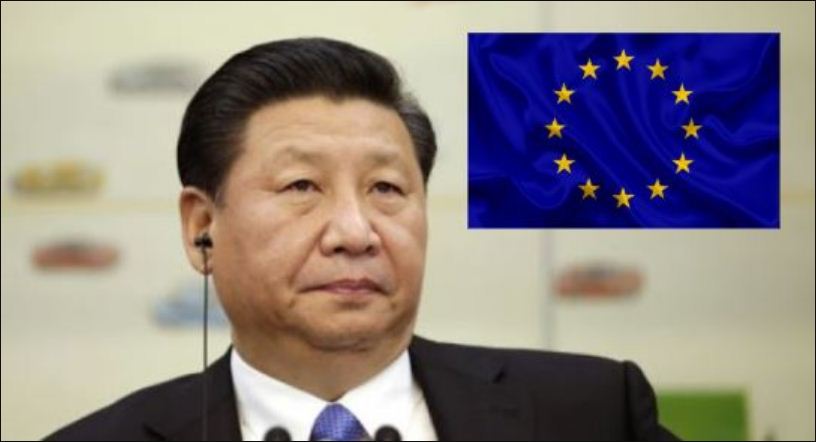China has further decreased, in its so-called negative market access list, the number of sectors and industries outside the limits of both Chinese and foreign investors. The move comes as the EU gears up for talks about a landmark Investment Treaty. After months of hostile negotiations between the European Union and China, it seems the Xi Jinping administration has finally decided to bow down.
The development comes after Xi Jinping dialled up French President Macron where the Chinese leader was desperate and appeased his French counterpart as Xi pushed for the development of stable China-EU relations. Since last month, Germany had been pushing for a disinvestment strategy to counter the dependence of China on supply chains unless China opens up EU’s access to Chinese markets. China’s bleeding economy and a rising ambition are forcing the Chinese hand to bow down to European wishes.
According to a document published on Wednesday by the National Development and Reform Commission, the number of industries that were limited or prohibited for 2020 was reduced to 123 compared to 131 sectors on the list for 2019.
International companies will now be licensed in China to explore and manufacture petrol and gas. The ban on foreign companies in China wanting to perform a carbon assessment has also been lifted. Industries that are not on the list are available and do not need approval for all investments.
This list was released in the run-up to the discussion of a historic investment treaty this week which had stalled market access, among other concerns, between China and the European Union (EU).
The EU has also urged China to comply with high market transparency, human rights security, and environmental standards.
Zhang Ming, Beijing’s envoy to Brussels, said last week that differences between the two sides have been narrowed and negotiations on market access and sustainable development were intensifying.
Zhang Ming’s statement, “We made breakthroughs on the level playing field issues, this is a solid step forward. We are now working on the Market Access and Sustainable Development chapters.”
The two sides want to conclude this agreement by year’s end, but there is growing doubt as to whether the pandemic and tension of the Covid 19 pandemic will lead to such issues as tensions between the two on Hong Kong and Xinjiang seem to be getting out of hand.
Moreover, Germany, the EU’s diplomatic and economical powerhouse has been pretty hostile to increased Chinese belligerence in the South China Sea. Berlin served China its most severe diplomatic shock as it revealed its India-centric Indo-Pacific strategy. The policy put forward by the German Ministry of Foreign Affairs also suggested the initiation of a Dialog with institutions, including the Bay of Bengal Initiative for Multi-Sectoral Technical and Economic Cooperation (BIMSTEC) and the Indian Ocean Rim Association for Regional Cooperation (IOCA), comprising 22 states on the boundaries of the Indian Ocean.
Therefore, to appease the European Union Xi Jinping went out of his way to call Emmanuel Macron. The Chinese are trying to set a narrative to appease Emmanuel Macron, placate him and the European Union, thus trying to hamper any possible collaboration between the USA and the EU.
Moreover, statements made by the EU’s ambassador to China must have sent alarm bells ringing in the red office. Ambassador Nicolas Chapuis, speaking in Beijing, said that the EU hopes to formulate an agreement with the next US administration on policy towards China. He said, “Let’s cooperate with China as much as we can when we can, when China is ready to cooperate. And let’s disagree when we must,” adding “we need to have a common understanding to say ‘no’ to bullying and intimidation, coercive diplomacy, ‘wolf-warrior’ diplomacy.”
This desperate last-minute measure comes when it has become all the more certain that the EU is searching for options so that it is no longer dependent on China at the current level. Chinese Foreign Minister Wang Yi’s recent visit is the best way to judge current ties. During his European tour, every country he visited had questions about human rights violations in the autonomous regions of China, be it Outer Mongolia, Tibet or Xinjiang, or Hong Kong.
Without sparing noisy preaching, every nation moved the buck to its fullest extent possible and did not endorse him. The tour was an immense failure, and from then on, China was informed by the actions of the European leaders that the EU was prepared to fight Chinese belligerence and that the partial market access that Beijing has so far leveraged will not be influenced.
And such is the hardship, that China faces, that it cannot afford to lose an investment market as large as Europe. The realities of a hostile and increasingly competitive International structure are beginning to set in and thus it seems that China is bowing to the realities of the global arena rather than being arrogant in the face of it. However, it remains to be seen whether these punitive economic concessions will be able to hold Europe in its fold.
